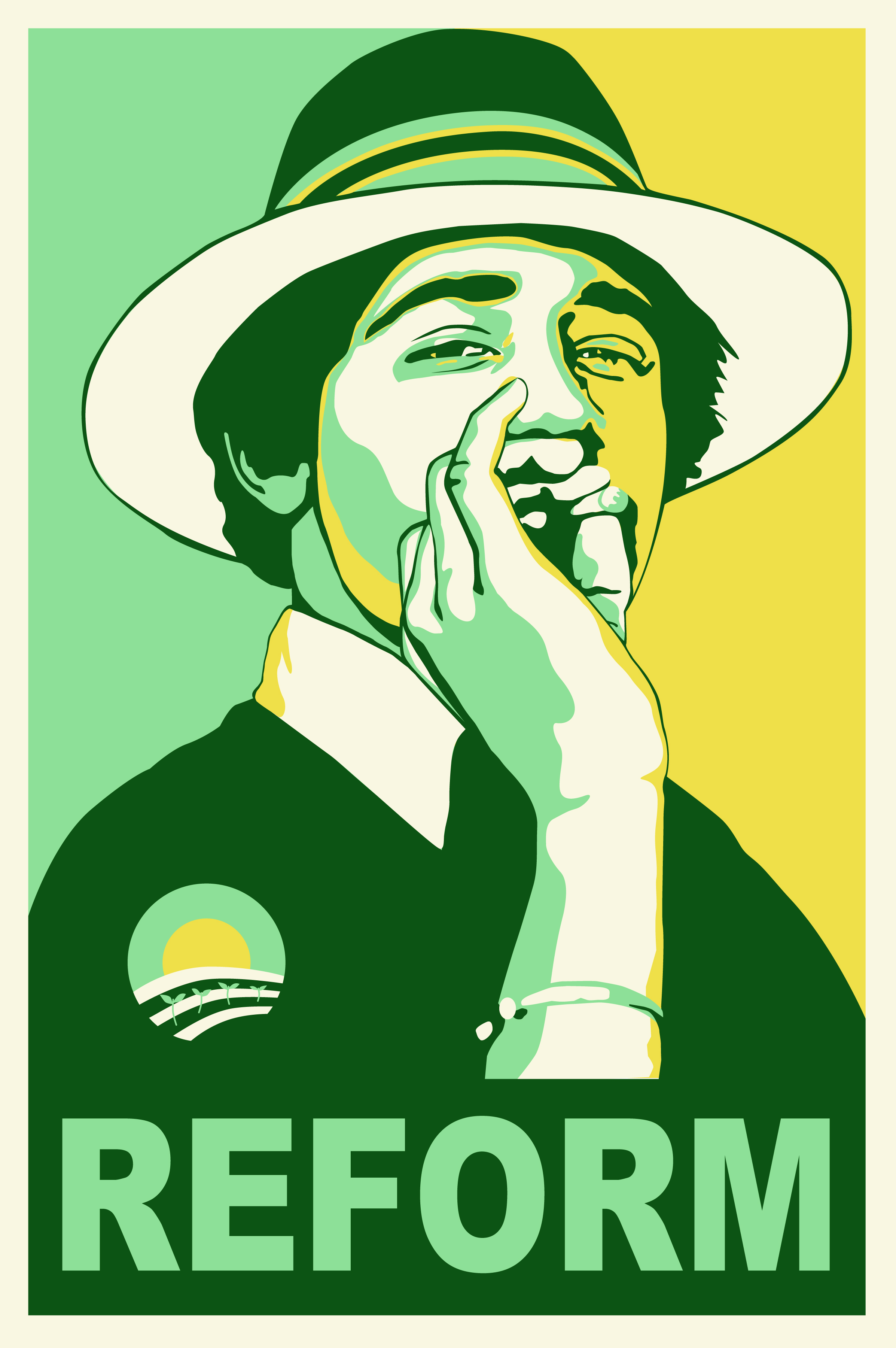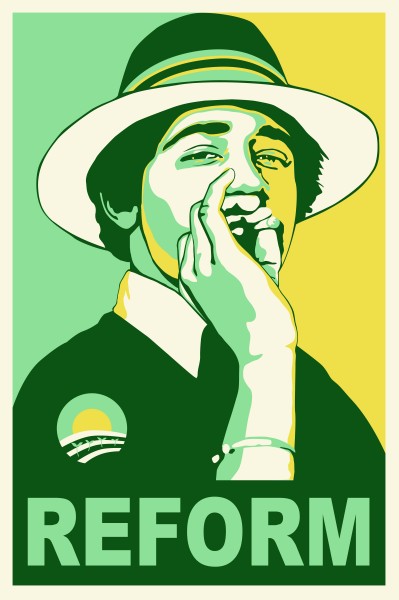A #Reeferendum represents the best way forward for cannabis law reform at this point in time. We should therefore all be pleased that it’s no longer just New Zealand First advocating on behalf of one. Thank you Helen Kelly for helping to lend legitimacy to the Reformist side of this debate.
But why a referendum? Why not go with the tried and tested previous approaches of Private Members’ Bills or voting for the Aotearoa Legalize Cannabis Party?
Because, frankly put, these simply don’t work.
It’s arguably something of a travesty that the ALCP at the last Election scored nearly double the support of the “party” which brought us legalized synthetic cannabis, yet doesn’t similarly possess a seat in Parliament with which to advance its cause. But that’s the electoral system for you.
Meanwhile, there’s a lack of serious political will on the part of our MPs to get even the best-thought-through legalization, decriminalization, or medicinal marijuana bill over the line.
To be fair, both the Parliamentary climate and broader political terrain are changing. No doubt inspired by successful US experiments in this area, popular support for the reform of cannabis laws continues to wax strong. MPs and Party Spokespeople have responded to this trend, and are softening (or strengthening, depending on side) their language, or even actively campaigning on the issue.
But we have some ways to go before enough MPs are prepared to get up, stand up, and be counted with their votes to change the law.
Opting for a referendum instead, however, represents something of a ‘softer’ option. Putting forward a Private Member’s Bill to give effect to or enact a referendum is viewed in a rather different light to acting directly to change the law.
After all, it’s merely giving effect to the pre-standing Will of the People on the issue.
And popular opinion seems to be fairly squarely on the side of law reform.
This is particularly the case in the wake of the synthetic cannabinoid “dairy dak” debacle, which not only demonstrated that legitimate selling of drugs is within the realms of possibility (and, for that matter, that it’s something the government’s quite prepared to countenance) – but more importantly conclusively demonstrated to many New Zealanders that the continued illegality of regular weed is allowing far more damaging trades to flourish.
Numerous examples from the United States and further afield have also proven time and time again that successful drug law reform isn’t just a pipe-dream, but instead a viable – even desirable – way forward.
The trouble is, in the absence of a mechanism to turn popular will into political reality, the feelings and opinions of the electorate on this matter remain impotent.
They’re roadblocked by the seeming fear many politicians have of being seen to make a change.
A referendum is therefore the logical way forward, as once enacted it removes politicians from the process by allowing us to go around them in order to get our voices heard.
We finally get to have our say.
It’s also the mechanism by which a number of US states successfully secured their own pathways to cannabis law reform both last year and earlier, proving (albeit in a number of foreign contexts) its efficacy as a change-vector for this issue.
Now to be fair, there are a number of potential issues and obstacles with pursuing this avenue to law-change here in New Zealand.
First and foremost is finding an MP or MPs prepared to stump up and sign their names to a Private Members’ Bill. It doesn’t matter whether the referendum process used is the Citizens Initiated Referendum one or a Parliamentary-initiated binding proposal. If we want our result to count like the Flag Referendum rather than being ignored like the Asset Sales Referendum, we need an enactment of Parliament to make it so.
And while I have no doubt whatsoever that there are more than a few MPs in Parliament right now who’d be prepared to support a cannabis referendum bill once it was already submitted, I regrettably suspect that there might be some difficulty to be had in finding an errant MP brave enough to sign their name to and put forward the bill in question.
The next obstacle will be ensuring sufficient MP support for the putative bill to make it through Parliament.
Assuming no abstentions (which reduce the numbers necessary for victory), this requires 61 votes.
This is a tall order, but not necessarily an insurmountable one. A clear and decisive majority of Parliamentarians, after all, voted for the Psychoactive Substances Act and its commitment to nominally evidence-based drug policy last term, while the number of staunch ‘moral conservatives’ in both National and Labour appears to have decreased somewhat in the interim.
So the obvious question is: “where to from here?”
At the moment, Concerned Citizens and cannabis crusaders need to be asking the strategic political questions.
What MPs to target for lobbying? What arguments to use in swaying swinging Parliamentarian consciences – and more importantly, the predominantly greying voters said politicians seem inordinately to listen to.
How, in a nutshell, do we turn the sadly extant quagmire of political intransigence on this issue into resolute and galvanized popular/parliamentary political action.
Because ultimately – whether you support a broader use of medicinal cannabis, less restrictive decriminalization, or full-blown legalization … this is an idea whose time has come. And who can argue against the greater use of the fruits of democracy.
With the tool of the #Reeferendum, we finally have the ability to make meaningful progress on this issue.
Let’s make the best possible use of this opportunity.







Totally agree. It’s now time to quit the “we have spoken you will obey” attitude of government and turn it back on them. If a referendum shows what The People have chosen, then they will obey. Hooray for democracy. After all, we can’t let Big Pharma dictate who lives or dies can we?
http://www.hightimes.com/read/drug-maker-secures-patent-thc-and-cbd-cancer-treatment
http://topdocumentaryfilms.com/cancer-forbidden-cures/
http://geopolitics.co/2015/12/25/us-federal-ban-on-medical-marijuana-silently-lifted/
Totally agree. It’s now time to quit the “we have spoken you will obey” attitude of government and turn it back on them. If a referendum shows what The People have chosen, then they will obey. Hooray for democracy. After all, we can’t let Big Pharma dictate who lives or dies can we?
http://www.hightimes.com/read/drug-maker-secures-patent-thc-and-cbd-cancer-treatment
http://topdocumentaryfilms.com/cancer-forbidden-cures/
Is there actually a way to force a referendum- no matter how initiated- to be binding? Successive governments have made it very clear that they don’t give two hoots about the will of the people except when it suits them. Didn’t something like 90% of the population vote for less MPs in one referendum? Still waiting…
Unless we are guaranteed a binding referendum from the get go is it even worth it?
what kay says/posits is correct..
..a non-binding referendum will change nothing..’
..and to my mind would be a waste of time and energy..
..and all to no avail..
..this is a bad idea..
I disagree Phil. As Curwen says, it would also give the MPs who voted for law change the ability to claim they are just implementing the will of the people, if challenged by their more socially conservative supporters. You’d be amazed how many MPs agree the change is needed when asked in private, but feel like it’s political suicide to support it publicly.
Yes, to initiate a referendum would be a huge effort, but it would also be a project that all the different groups supporting drug law reform could support and work together on in different ways. A way to get us all pulling in the same direction again, and to demonstrate just how many people care about fixing a broken law that continues to put thousands of otherwise law-abiding kiwis in prison unjustly, costs the public millions of dollars in invasive enforcement, and denies the public millions of dollars in tax revenue.
The big challenge is going to be agreeing on what question the referendum should ask. Should we play it safe and focus on medical? Take the middle road, as the Law Commission did, and meekly suggest some kind of decriminalization? Or go for broke and propose the full regulated, taxed market approach that’s working so well in Washington, Colorado, Oregon, DC, and Alaska?
Strypey, you raise some good points, all perfectly reasonable. Unfortunately, as you point out, our politicians are cowards and they’ve proven that over and over, no wonder so many of us are cynical about any attempts to force them to enact the will of the majority.
Personally I’d back the go for broke option, but given the political resistance I believe we’ll have to start with legalising medical use. By NZ standards that would be a significant victory, many people would benefit and it would make further legalisation down the track harder for politicians to oppose.
@ strypey..
..as you note..’a/any referendum would be a huge effort’..
..and that is why i oppose expending all that energy on anything that is non-binding..
..as all that effort (if non-binding) can just be ignored by the government of the day..
..yes..it would garner publicity..would give common-cause..
..but i don’t think those benefits are enough.
..and a non-binding referendum could well be welcomed by the prohibitionists/alcohol-lobby..as a significant delaying tactic..(and one that can ultimately be ignored)..
..i am almost really impatient with this issue..
..all the arguments have been made/proven..
..we just continue to go round and round in fucken circles..
..i mean..where key has his holiday home has had med-pot for over 20 yrs..and is moving to full legalisation..
..does/has any journo have the wit/fucken intelligence to ask key about this…?..about what scenes of societal-dissolution he has observed in hawaii as an outcome from med-pot..?
..do they fuck..!
..were any referendum binding i would fully support it…a non-binding referendum would just help to further delay the inevitable..
..and is something the prohibitionists/booze-lobby would welcome..
@ Phil
>> a non-binding referendum would just help to further delay the inevitable..<<
I can't be certain a referendum would speed law change but you haven't presented a single coherent argument for the claim that it would delay it. Can you do that? I can point out that referenda have been part of the process in other jurisdictions, and that it offers a way for the silent majority to express their desire for legalization, without having to risk publicly outing themselves as "druggie sympathizers".
If you don't want to support a campaign to initiate a referendum, fine, that's your choice. You're free to focus your energy elsewhere. Why waste it being knocking someone else's initiative?
YES! They’re gonna legalise it! I heard it on the teepee P.A.
It amazes me how the United States can still be both the most progressive & the least progressive power on earth. NZ is behind the US on this particular issue which is absurd.
Not quite the ‘united’ states. Some states, with various degrees of legalisation. The majority of states still remain stuck with unjust laws.
Decriminalisation will take the value out of the product and help reduce gang and criminal revenues, it will also reduce the amount of police time involved in chasing minor drug offences and they can concentrate on the important stuff.
Decriminalisation will take the value out of the product and help reduce gang and criminal revenues, it will also reduce the amount of police time involved in chasing minor drug offences and they can concentrate on the important stuff.
A referendum sounds like a good idea but as we have seen with the flag referendum it can quite easily be manipulated by an unscrupulous government, or even parliament itself.
The bottom line is neither National nor Labour would want cannabis reform to go on its record, they would both be too scared of the potential electoral backlash. Therefore its a good bet that any referendum would be either non-binding and/or so ambiguously worded to make it unworkable.
When it comes down to basics, most New Zealanders have a pathological fear of cannabis for recreational use. They might at a pinch allow medical use of it because it does have some compelling arguments but to allow use of it along the same lines as say alcohol or tobacco is probably not going to happen.
“most New Zealanders have a pathological fear of cannabis for recreational use.” You mean the overwhelming majority in poll after poll who want law reform? Politicians care more about the will of Big Booze and Big Pharma than they do about the will of the people.
4 States legal for recreational. 19 more have ‘medical marijuana’. And 17 more allow CBD oil. The majority of US states allow cannabis when needed.
Source: ‘History.Channel.The.Marijuana.Revolution’
Highly recommended.
Comments are closed.